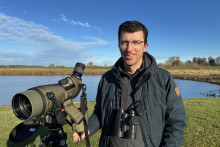‘We have good education,’ says Hans Romkema, coordinator of teacher development at the faculty of EEMCS. ‘We want better education. We can achieve that goal by striving for greater appreciation and acknowledgement for teachers who contribute to innovations in education. The idea is that excellent teachers have a huge influence on the quality of education, and they get other people on board as well.’
The University of Lund (Sweden) was the source of inspiration for this approach. ‘It’s a research-focused approach for shaping education. That is why it works at a university. It starts with the teachers we ask to use their research attitude in solving design problems in education, as well as reflecting on that process. Once they flip that switch, the teachers start enjoying it, because they are researchers through and through.’
Pilot
EEMCS is currently working on an implementation within its own faculty. Twenty teachers are involved in the process. They will present their educational innovation during a seminar. Educational consultant Karen Slotman says: ‘We ask them to consider ahead of time what they want to achieve with their new educational method, and to reflect on whether expectations were met and which aspects played a part in the success or failure of a project afterwards. By making choices based on literature, for example.’
Sharing those experiences is vital according to Slotman. ‘As well as the ensuing discussion. How do students learn, and what is the best way for them to learn? One teacher chose to implement a small part of his own course material in a challenge, for example. The end goal is for education as a whole to be permeated by someone’s educational vision. One of the people involved recently published his research approach at a conference. An excellent example of sharing experiences outside of the UT.’
Excellent
Assessing whether a teacher is excellent is based on substantiated reflection. ‘We’re not going to sit in a lecture hall and look at how a teacher does things. What matters is how the course is designed and how the teacher reflects on that. Additionally, we want to see how the teacher has developed over the course of time.’
Improving the quality of education is necessary, according to Romkema, in order to better balance research and education. ‘Education is under a great deal of pressure. Especially when compared to research. And research is always prioritized, in a variety of ways. Moreover, education isn’t always appreciated in the same way by everyone in the academic community.’
Slotman adds: ‘Teachers feel cheated if they work hard at improving education. With ETP, we want to make sure that a teacher is appreciated more.’ A reward system ties into this idea. ‘But we haven’t gotten to that point yet. What will happen, however, is the creation of a network that you become a member of. And the title of ETP teacher should, in time, become a status symbol.’ Additionally, EEMCS wants to know whether this model can be applied across the entire UT.
The ETP programme is open to all EEMCS teachers, regardless of where they are in their research. It is not linked to the UFO profile, the Universal Teaching Qualification (UTQ) and the Senior University Teaching Qualification (SUTQ). More information: https://www.utwente.nl/en/eemcs/educational-quality/teacher_development/
This article appeared in the special edition 'A tribute to excellent teachers'.







